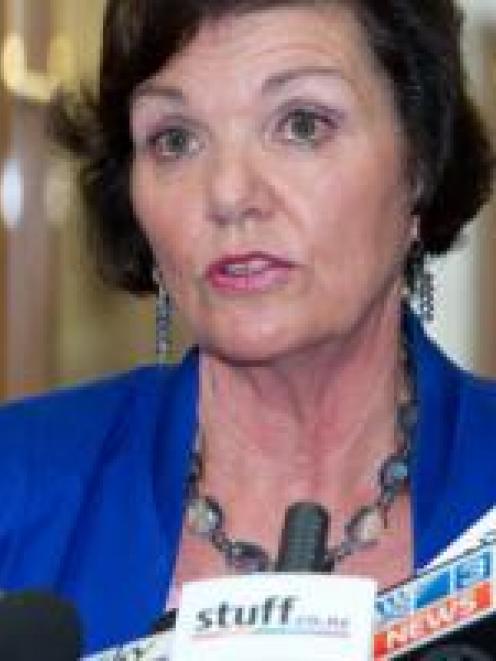
The panel, led by economist Paula Rebstock, has recommended CYF should adopt an "investment approach" to needy children, intervening earlier in partnership with other agencies.
It also recommended a new advocacy service for children in state care which would be run by the philanthropic sector.
The panel's interim report, released by Social Development Minister Anne Tolley today, does not provide the detailed agenda for change that was expected. That has been left for its final report due in December.
But it is critical about the performance of the current system, saying it was "focused on managing immediate risk and containing short-term costs".
"This focus has come at the expense of the prevention of revictimisation, remediation of harm and supporting long-term outcomes," the panel says.
An investment approach would "take a lifetime view of costs and benefits and direct effort and capability towards earlier intervention for vulnerable children".
The Government has already adopted an "investment approach" to the benefit system, also recommended by Ms Rebstock when she chaired the Welfare Working Group in 2010.
In that case, the approach has meant shifting Work and Income's staff and resources from supporting people who are temporarily unemployed to helping sole parents and people with health and disability issues to find work because otherwise they would cost taxpayers much more in the long term.
This time the panel has recommended, and Mrs Tolley has commissioned, an independent actuarial feasibility study into how the same approach would work for vulnerable children.
The panel says the approach would "provide incentives to intervene with the right service as early as practicable with the right children, young people and families, by ensuring that agencies and non-government providers are accountable for achieving improved outcomes which will reduce costs in the longer term".
'Uncertainty' between agencies
"The current system consists of multiple agencies and is largely based on the performance of functions with compartmentalised responsibility and accountability within and between them," the report says.
"This has been accompanied by on-going uncertainty within and between agencies on their respective roles and functions in realising the objectives set out in the Children, Young Persons and Their Families Act, which has not been resolved by the introduction of the Vulnerable Children Act. This includes confusion about the role of the statutory system in situations of chronic harm and high longer-term risk, and uncertainty about obligations around the needs of children in care.
"CYF does not currently have a clear mandate to direct services from the wider sector towards the care and protection of vulnerable children. This results in their inability to access the right services for children and families until they have escalated further into the system, limiting effectiveness of early prevention activities.
"Children's teams, whanau ora, social sector trials are all working with vulnerable families but there is no systematic approach to achieving results for children and young people in a coordinated way."
The panel says CYF also "does not provide regular enough engagement with children, families or caregivers" and there is "no independent voice or agency of sufficient size and capability to speak for children and hold the system to account".
It recommends "engaging the philanthropic sector to support the development of an advocacy service for children and young people involved with the care and protection and youth justice sectors".
Mrs Tolley said the panel had already started with the philanthropic sector to discuss how the new service might work. Experts expect that it may be modelled on Who Cares? Scotland, an independent philanthropic advocacy service for children in care in Scotland. Who Cares? chief executive Duncan Dunlop is a member of the Rebstock panel.
Youth residences criticised
Despite rumours that the panel would recommend wholesale privatisation of many of CYF's functions, the interim report does not directly recommend any more "outsourcing" apart from the general proposal to intervene early with "the right service".
However, it is highly critical of CYF's nine youth residences, suggesting that they should be replaced by "smaller, more localised services".
"Evidence and experience show that the propensity of large-scale institutions to cause harm to vulnerable children generally outweighs the security and safety benefits," the report says.
"Cold, sterile facilities like some of the CYF residences run the risk of re-traumatising children and young people. Security and safety can often be dealt with by smaller, more localised services where a stronger connection to communities and tailored support would also provide a better chance of healing and development."
The interim report does not make a recommendation on raising the age at which young people leave state care, which is currently 17. But Mrs Tolley said the panel was still working on this.
"My view is that we should raise the age of care. The question is by how much?" she said.
"And should the state consider having some kinds of obligations for support for these young people into their 20s, as I saw on a visit to Europe earlier this year, and what should that, could that, look like?"
Mrs Tolley said some of the statistics in the report were "horrifying".
She said by the time children with a care placement who were born in the 12 months to June 1991 had reached the age of 21:
• Almost 90% were on a benefit;
• More than 25% were on a benefit with a child;
• Almost 80% did not have NCEA Level 2;
• More than 30% had a youth justice referral by the age of 18;
• Almost 20% had had a custodial sentence;
• Almost 40% had a community sentence;
• Overall, six out of every 10 children in care are Maori.
"This simply cannot be allowed to continue," Mrs Tolley said.
- By Simon Collins of the New Zealand Herald












